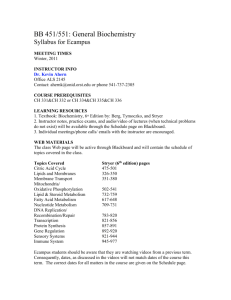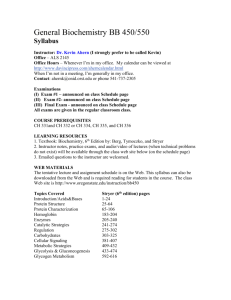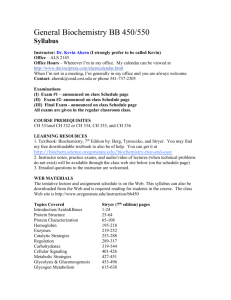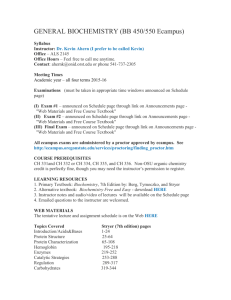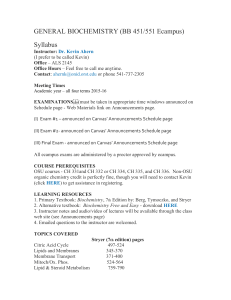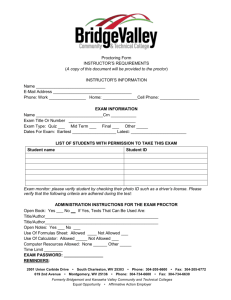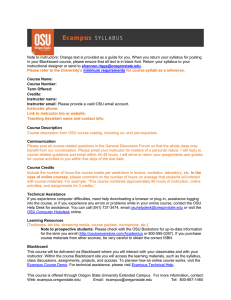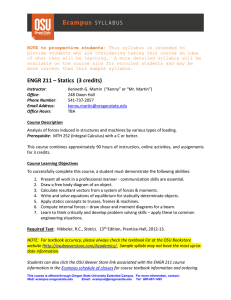General Biochemistry BB 451/551
advertisement
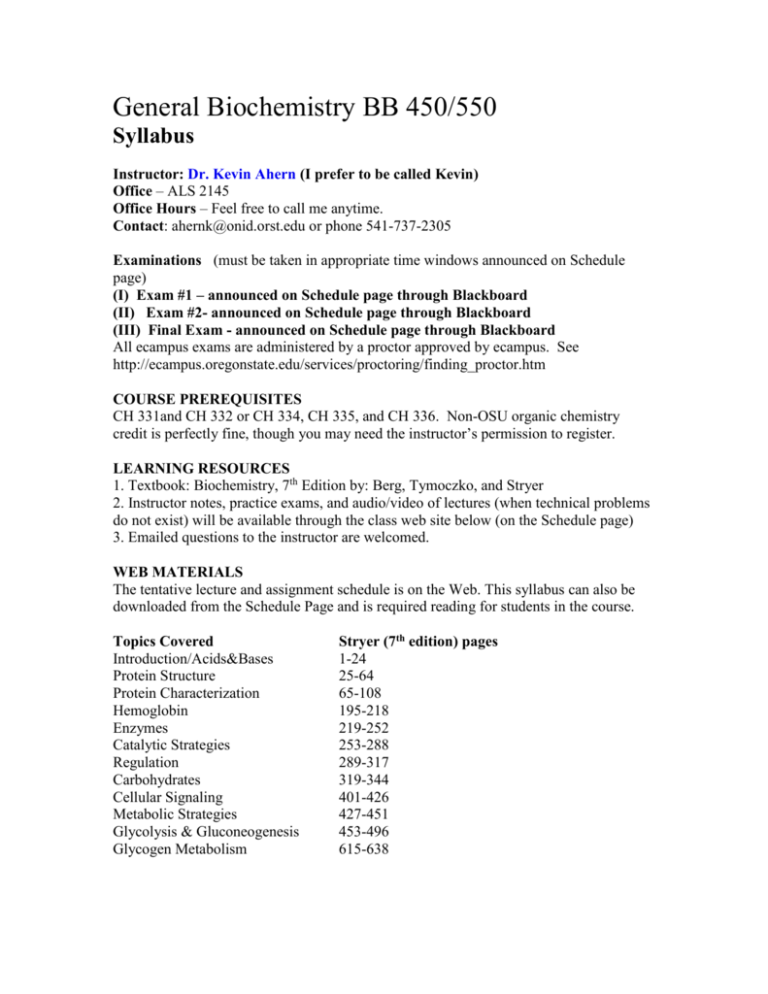
General Biochemistry BB 450/550 Syllabus Instructor: Dr. Kevin Ahern (I prefer to be called Kevin) Office – ALS 2145 Office Hours – Feel free to call me anytime. Contact: ahernk@onid.orst.edu or phone 541-737-2305 Examinations (must be taken in appropriate time windows announced on Schedule page) (I) Exam #1 – announced on Schedule page through Blackboard (II) Exam #2- announced on Schedule page through Blackboard (III) Final Exam - announced on Schedule page through Blackboard All ecampus exams are administered by a proctor approved by ecampus. See http://ecampus.oregonstate.edu/services/proctoring/finding_proctor.htm COURSE PREREQUISITES CH 331and CH 332 or CH 334, CH 335, and CH 336. Non-OSU organic chemistry credit is perfectly fine, though you may need the instructor’s permission to register. LEARNING RESOURCES 1. Textbook: Biochemistry, 7th Edition by: Berg, Tymoczko, and Stryer 2. Instructor notes, practice exams, and audio/video of lectures (when technical problems do not exist) will be available through the class web site below (on the Schedule page) 3. Emailed questions to the instructor are welcomed. WEB MATERIALS The tentative lecture and assignment schedule is on the Web. This syllabus can also be downloaded from the Schedule Page and is required reading for students in the course. Topics Covered Introduction/Acids&Bases Protein Structure Protein Characterization Hemoglobin Enzymes Catalytic Strategies Regulation Carbohydrates Cellular Signaling Metabolic Strategies Glycolysis & Gluconeogenesis Glycogen Metabolism Stryer (7th edition) pages 1-24 25-64 65-108 195-218 219-252 253-288 289-317 319-344 401-426 427-451 453-496 615-638 GRADING Course Points Distribution - Exam 1 (25%), Exam 2 (25%), Final Exam (45%), Turning in assigned problems on time (5%). There is no extra credit possible beyond the occasional questions asked on exams and therefore I do not (and in fact cannot) take improvement during the term into consideration in assigning grades. No fixed grading scale will be used to assign letter grades and no fixed numbers of letter grades are set. Since there is no fixed grading scale (90/80/70/60, for example) grades are therefore "curved," since this is the definition of what "curved" means. If you ask if grades in the course are curved, you will lose points. Grades will be assigned on groupings as determined by the instructor at the conclusion of the course. Approximate letter grades will be given during the term. Undergraduates will be evaluated and graded separately from graduate students. COURSE POLICIES I love teaching this course and enjoy discussion and meetings with you. I know that the subject of biochemistry strikes terror in the hearts of many, so I see my role partly as helping you to overcome that fear in order to do well. I will do everything I can to help you learn more of this exciting subject and help you overcome your fears of it. Some of the most rewarding experiences I have had in teaching this class are helping students in this very way. I expect you to be involved and responsible for your own education, as much as possible. Students who ask questions that are answered in the syllabus are not being responsible. The aim of this statement is not to discourage students from discussing their standing in the class, but rather to have students participate more fully in their own education. I will gladly discuss any student's grade as it stands at any time in the course, but students need to use resources available to them to their fullest. Similarly, students need to consult exam keys and relevant videos and transparencies before asking questions or requesting regrades. Students taking examinations are not allowed to use a calculator, books, or notes of any kind. Other than a pencil/pen, no other materials are allowed for student use on exams. The sole exception to this is that on the final exam ONLY, students are allowed to bring with them and use one note card with information on it handwritten by the student. The notecard must be no larger than 5x8 inches and printers may not be used to make it. All items on the card MUST be handwritten or hand-drawn. EXAM POLICIES Exams have been taken by students from all over the world in this course, including war zones. They simply require a proctor approved by OSU’s ecampus. at the beginning of the term. Contact them at http://ecampus.oregonstate.edu/services/proctoring/finding_proctor.htm or at 800-6671465 or 541-737-9204. It is required that exams be taken within the time windows defined on the Schedule page. Preparing makeup exams requires a significant effort. There will be three exams given in this course (including the final). The final will be comprehensive. Reading and studying the assigned material before the lecture date is essential for success. Excused absences will not be given for missing exams due to airline reservations, routine illness (colds, flu, stomach aches), or other common ailments. Excused absences will almost never be given after the absence has occurred. Students therefore must notify the instructor if they encounter difficulties BEFORE the exam occurs. If I decide your reason for missing an exam is valid, I might allow you to take a makeup exam. The following situations are NOT grounds for missing an exam: 1. You misread the date of the exam on the syllabus. 2. You went to the wrong room. It is the responsibility of each student to check that their exam has been properly graded. If errors are made, or if the student feels that more points should have been awarded for a particular question, students must write a CLEAR explanation stating their case. Requests for regrading must be made in writing within 3 school days after the examination is made available to the class. Failure to follow these instructions will result in automatic denial of the request. Frivolous requests involving “fishing for points” (for example – asking me to regrade simply to award you more points without a valid reason) will result in loss of points. LETTERS OF REFERENCE I am frequently asked to write letters of reference for students from the class. Since I must know a student personally to write a letter of reference, it is almost never possible for me to do this in the ecampus, unless I know you through some other means. If you are curious, I do have a written policy for letters of reference – www.oregonstate.edu/dept/biochem/ahernletters.html REGISTRATION DEADLINES I expect students will meet all deadlines as appropriate for withdrawing from the class, should that be necessary. I do not routinely approve petitions to make changes after deadlines have passed, except in extraordinary circumstances. The deadline for dropping classes (no grade) during the academic year (fall, winter, spring terms) is the second week of class. The deadline for withdrawing from a class (grade of W) is the seventh week during the academic year. If you do not withdraw by Friday of the seventh week of the term, you will receive a grade in the course. Summer deadlines are different and students are responsible for confirming such deadlines with the OSU Registrar. POLICY ON INCOMPLETES A grade of I is appropriate when 1) a course requirement has not been completed due to circumstances beyond the control of the student and 2) at least half of the work for the course has been completed at a level of C- or better. For medical problems that prohibited the student from fulfilling a requirement of the course, a note from a doctor is required. The request may be supplied without the note, and the request (if acceptable) will typically be granted, conditional on the note being provided later. For other circumstances, supporting evidence, such as a note from an advisor, will be helpful to the petitioner's case. The following is a list of reasons that are not acceptable: The course proved to be more time-consuming or difficult than expected. Work in other courses ended up taking too much time. Work or travel associated with a job ended up interfering with course work. Time conflicts prohibited contact with the instructor or TAs during office hours, The student misunderstood the requirements or grading schemes of the course. The student wishes to avoid a low grade. The student wishes to retake the course at a later date LEARNER OUTCOMES The intention of the course is for students to: 1. Acquire the technical language used to communicate biochemistry information 2. Recall key elements of basic biochemistry principles, including metabolic pathways, molecule names, molecular structures (as noted), control mechanisms, and terms used to describe categories of molecules 3. Perform analyses relevant to the material presented 4. Communicate (through writing) key concepts relevant to biochemistry 5. Understand and apply general concepts of biochemistry to relevant, specific problems. 6. Predict the directions of metabolic pathways from an understanding of the control mechanisms and energy considerations of each. LEARNER EXPECTATIONS 1. Advance preparation 2. No last minute studying 3. Questions to answer concepts/processes that the student does not understand BEFORE it is too late. 4. Recognition that an understanding of a complex topic like biochemistry requires considerable background prior to the class, a considerable amount of information to be acquired in the class, and sufficient time and effort to put these together to master the material. GENERAL OSU AND DEPARTMENTAL POLICIES Please note: "Students with documented disabilities who may need accommodations, who have any emergency medical information the instructor should know, or who need special arrangements in the event of evacuation, should make an appointment with the instructor as early as possible, no later that the first week of the term. In order to arrange alternative testing, the student should make the request at least one week in advance of the test. Students seeking accommodations must be registered with the Office of Services for Students with Disabilities." The Department of Biochemistry/Biophysics follows the university policies on student conduct. These can be found at http://oregonstate.edu/admin/stucon/regs.htm. Cheating or plagiarism by students is subject to the disciplinary process outlined in the Student Conduct Regulations. Students are expected to be honest and ethical in their academic work. Academic dishonesty is defined as an intentional act of deception in one of the following areas: * cheating- use or attempted use of unauthorized materials, information or study aids * fabrication- falsification or invention of any information * assisting- helping another commit an act of academic dishonesty * tampering- altering or interfering with evaluation instruments and documents * plagiarism- representing the words or ideas of another person as one's own Behaviors disruptive to the learning environment will not be tolerated and will be referred to the Office of Student Conduct for disciplinary action. The goal of Oregon State University is to provide students with the knowledge, skill and wisdom they need to contribute to society. Our rules are formulated to guarantee each student's freedom to learn and to protect the fundamental rights of others. People must treat each other with dignity and respect in order for scholarship to thrive. Behaviors that are disruptive to teaching and learning will not be tolerated, and will be referred to the Student Conduct Program for disciplinary action. Behaviors that create a hostile, offensive or intimidating environment based on gender, race, ethnicity, color, religion, age, disability, marital status or sexual orientation will be referred to the Affirmative Action Office.
